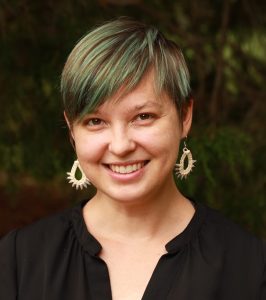“Every young adult is facing a lot of change during that period of life,” said Jessica Stahl, MD, MS, assistant professor in the division of nephrology and hypertension, about the topic Dr. Emily Chang recently chose for Nephrology Grand Rounds.
“You might remember how different it was at first to live independently from your parents, choose your own classes, find a job, pay your bills. You may be watching your own children or family going through this stage of development right now. Having people who helped prepare us for what to expect and who were there to reach out to as we learned to navigate our burgeoning independence set us up to become successful adults.
“Emily’s conversations with her patients highlighted that learning how to be an adult patient is one more component to consider and how important it is to have support and guidance throughout the process. The themes she identified in her conversations with patients, adult, and pediatric providers show that our institutional experience aligns well with what we know about the experience of transition from other research studies.”

Nephrology Grand Rounds
Emily Chang, MD, assistant professor of medicine in the division of nephrology and hypertension, presented Nephrology Grand Rounds in January. The topic was prompted by her own experience with a dialysis patient while working through several medical issues.
“As an adult nephrologist whose practice consists of a majority of older people (>55 years I would estimate), I never really thought much about the prior experience of my young adult patients who were diagnosed with kidney disease as a child,” said Chang.
Chang wanted to understand more. Her approach was to talk to a sampling of patients who have been cared for in the UNC Health system, to try and understand their histories and what they had experienced growing up.
“It was, for me, an experience that taught me so much. I had no idea about the challenges they faced growing up with kidney disease, but also now navigating the adult world, not to mention kidney disease.“
Dr. Chang’s talk highlighted the need for anyone taking care of adults to be aware of the special needs of “newly adult” patients with chronic disease, who are transitioning out of pediatric care and may have experienced a very different kind of relationship with their doctor, said Anne Froment, clinical research manager.
“What struck me most were comments from young patients about how they used to feel special as pediatric patients, but not anymore. We want everyone to feel special!”
Chang says some of the areas that stood out in her conversations were about the importance of parents and providers in the patient’s early, and even present, journey.
“Most patients talked about the importance of parents, particularly moms in their early journey. As they grew up, there was more reliance on friends. Providers named included doctors, dialysis nurses and even a study nurse for a patient who was involved in a research study. A number of patients really relied on their providers and even to this day, still do.”
The importance of peers, both those with kidney disease and those in other spheres of their lives, were an important part of development. The role of kidney camp was emphasized, either as something they really got a lot out of, or something that they wish they had a chance to experience. One patient had a very close friend from kidney camp who later died but shared their experiences.
Others mentioned the hesitancy to tell friends about their condition because they didn’t want to be pitied or treated differently. But the message that made the greatest impression on Chang was the mental health challenges that everyone faced, although in very different ways for each individual and with different degrees of recognition.
“Depression was experienced when the disease led to taking away a scholarship or changing the career path of a patient. Depression was also a result of chronic medicalization. It kept some patients from participating in activities with their peers, such as sports, working, etc.”
Chang expresses her gratitude for the young people who shared their time and thoughts. She also says the preparation and learning for Nephrology Grand Rounds will make her a better doctor.
“When I have adult kidney patients, who were diagnosed as kids, I’ll remember they are not the same as my patients who are diagnosed as adults. They may need a little extra time and attention, even if they act like they don’t need it. In the past, I’ve taken this at face value, but now I understand that they may not have had the same cognitive development, and even though they want autonomy and to show they are in control, they might not be, and I need to be more attentive to signs of that.”
Got Transition
For information on transitioning adolescents from pediatric to adult clinics, visit Got Transition, a federally-funded national resource center for health care transition. The organization provides research on health care transition with guidance for patients, caregivers, and clinicians, as well as recommendations for clinicians on how to prepare patients for adulthood as pediatric providers, and how to integrate young adults into adult health care as an adult clinician.
